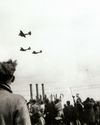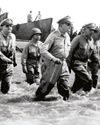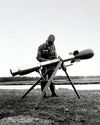
After the end of World War I, those units in the regular divisions of the army that would form the first British Army of the Rhine in 1919 remained and took on many of the soldiers that had time to serve before demobilisation or wished to continue in the army.
The fighting of the Great War had finished but the Machine Gun Corps (MGC) continued to see service in northwest Russia supporting the imperial forces there, in northwest India and Afghanistan until 1921. Their final engagements were in 1922 in Ireland as part of the transition of power to the Irish Free State. The last battalion of the MGC to see service was the 1st Battalion and they returned to Shorncliffe, Kent, for disbandment on 15 July 1922. Those who remained in MGC were transferred to other units or left the army.
With only six years, nine months and two days of service, the MGC had seen around 200,000 men pass through its ranks, the majority of whom served overseas. At least 16,917 had died in service (this number continues to grow as more evidence is found) and up to another 50,000 had been wounded or taken prisoner.
This story is from the {{IssueName}} edition of {{MagazineName}}.
Start your 7-day Magzter GOLD free trial to access thousands of curated premium stories, and 9,000+ magazines and newspapers.
Already a subscriber ? Sign In
This story is from the {{IssueName}} edition of {{MagazineName}}.
Start your 7-day Magzter GOLD free trial to access thousands of curated premium stories, and 9,000+ magazines and newspapers.
Already a subscriber? Sign In

NAUMACHIA TRUTH BEHIND ROME'S GLADIATOR SEA BATTLES
In their quest for evermore novel and bloody entertainment, the Romans staged enormous naval fights on artificial lakes

OPERATION MANNA
In late April 1945, millions of Dutch civilians were starving as Nazi retribution for the failed Operation Market Garden cut off supplies. eet as In response, Allied bombers launched a risky mission to air-drop food

GASSING HITLER
Just a month before the end of WWI, the future Fuhrer was blinded by a British shell and invalided away from the frontline. Over a century later, has the artillery brigade that launched the fateful attack finally been identified?

SALAMANCA
After years of largely defensive campaigning, Lieutenant General Arthur Wellesley went on the offensive against a French invasion of Andalusia

HUMBERT 'ROCKY'VERSACE
Early in the Vietnam War, a dedicated US Special Forces officer defied his merciless Viet Cong captors and inspired his fellow POWs to survive

LEYTE 1944 SINKING THE RISING SUN
One of the more difficult island campaigns in WWII's Pacific Theatre saw a brutal months-long fight that exhausted Japan’s military strength

MAD DAWN
How technology transformed strategic thinking and military doctrine from the Cold War to the current day

BRUSHES WITH ARMAGEDDON
Humanity came close to self-annihilation with the Cuban Missile Crisis, Broken Arrows’ and other nuclear near misses

THE DEADLY RACE
How the road to peace led to an arms contest between the USA and USSR, with prototypes, proliferation and the world’s biggest bomb

THE MANHATTAN PROJECT
Einstein, Oppenheimer and the race to beat Hitler to the bomb. How a science project in the desert helped win a war